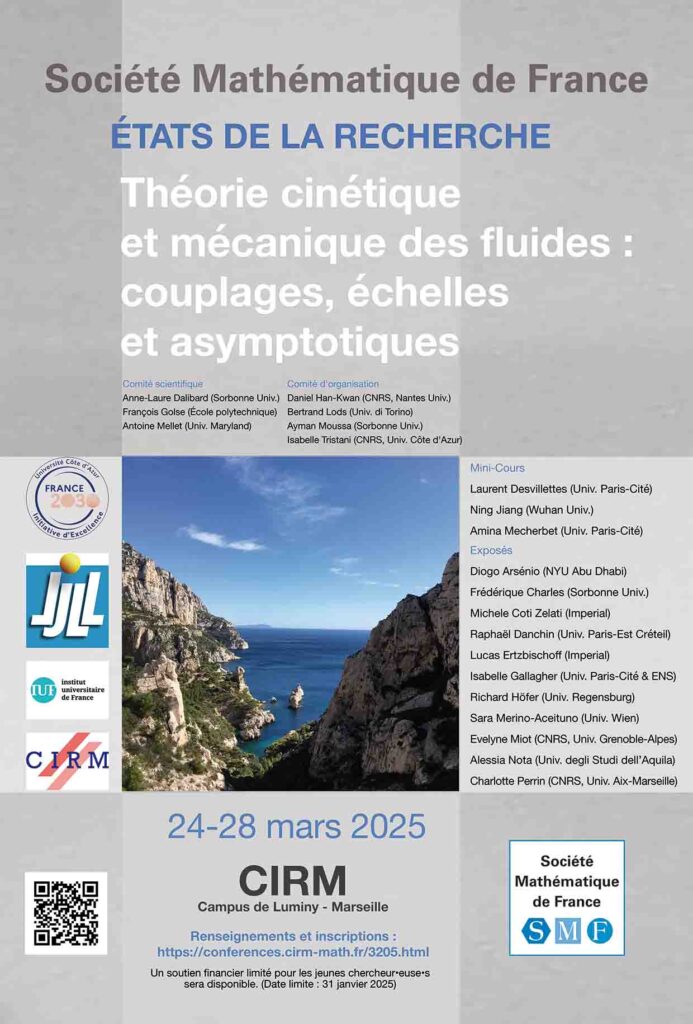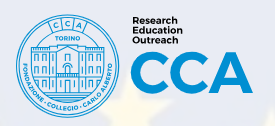Scientific Committee
Comité scientifique
Anne-Laure Dalibard (Sorbonne Université)
François Golse (École Polytechnique)
Antoine Mellet (University of Maryland)
Organizing Committee
Comité d’organisation
Daniel Han-Kwan (CNRS, Université de Nantes)
Bertrand Lods (University of Torino)
Ayman Moussa (Laboratoire Jacques-Louis Lions, Sorbonne Université)
Isabelle Tristani (CNRS, Université Côte d’Azur)
This session of the “ États de la Recherche SMF “ will focus on partial differential equations from kinetic theory and fluid mechanics. More specifically, particular attention will be paid to complex systems coupling kinetic and fluid equations, and to asymptotic limits aiming at rigorously recovering such PDEs from first principle physics.
Fluid-kinetic couplings were introduced some forty years ago to describe the evolution of a spray, that is to say a dispersed phase (a large number of particles) within a continuous one (a fluid). They are the subject of numerous research programs, both for the mathematical questions they raise and for the many concrete applications they may find. One important issue is the rigorous derivation of such systems, starting from a microscopic model (N particles in a fluid, in the limit N → +∞).
On the other hand, fluid equations can be derived from kinetic equations in some physically relevant regimes. This is an old question that dates back to the beginning of the 20th century, and which can be seen as an important part in the program of axiomatization of physics initiated by Hilbert in 1900. A great deal of work has led to very significant advances in the 1990s and 2000s, but important questions have been left open and this is still a very active field of research.
Cette session des États de la Recherche de la SMF se concentrera sur des systèmes d’équations aux dérivées partielles provenant de la théorie cinétique des gaz ou de la mécanique des fluides. Plus précisément, une attention particulière sera portée à des modèles couplant une équation fluide à une équation cinétique ainsi qu’à des problèmes d’asymptotiques visant à dériver rigoureusement ces systèmes d’EDP à partir de principes physiques fondamentaux.
Introduits il y a une quarantaine d’années pour décrire l’évolution d’une phase dispersée (des particules) au sein d’une phase continue (un fluide), les couplages fluide-cinétique font l’objet de nombreux programmes de recherche, à la fois pour les questions mathématiques qu’ils soulèvent et pour leurs multiples applications concrètes. Un enjeu majeur est la dérivation rigoureuse de ces systèmes, partant d’un modèle microscopique (N particules dans un fluide, dans la limite N → +∞).
Par ailleurs, il est aussi possible de dériver des équations de la mécanique des fluides à partir d’équations cinétiques, en considérant des asymptotiques réalistes d’un point de vue physique. Il s’agit là d’un problème ancien qui tire ses origines au début du 20ième siècle et peut être vue comme une étape importante du programme d’axiomatisation de la physique initié par Hilbert en 1900. De nombreux travaux ont permis des avancées très significatives dans les années 1990 et 2000 mais d’importantes questions sont encore ouvertes et il s’agit d’un champ de recherche toujours très actif.
MINI-COURSES
Laurent Desvilettes (Université Paris Diderot) Some aspects of the mathematical theory of sprays
Ning Jiang (Wuhan University) Hydrodynamic limits of Boltzmann equations
Amina Mecherbet (Université Paris Cité) Homogenization of Stokes-Brinkman type models and mean field limit
SPEAKERS
Diogo Arsénio (NYU Abu Dhabi) Entropic Dispersion and the Heat Death of the Universe
Frédérique Charles (Université Grenoble-Alpes) Diffusion asymptotic for gas-particle mixture with energy exchanges
Michele Coti Zelati (Imperial College London) Alpha-unstable flows and the fast dynamo problem
Raphaël Danchin (Université Paris-Est Créteil) Long time asymptotics of the solutions to the VNS equations in the whole space
Lucas Ertzbischoff (Université Paris Dauphine – PSL) Thick spray equations: a review
Isabelle Gallagher (Université Paris-Cité, ENS-PSL) The Navier-Stokes limit of kinetic equations for low regularity data
Richard Höfer (University of Regensburg) Derivation of the Vlasov-Stokes equation for particles with very small inertia
Sara Merino-Aceituno (University of Vienna) Collective motion on a Stokes fluid
Évelyne Miot (CNRS, Université Grenoble-Alpes) On the dynamics of point vortices and vortex filaments in two fluid models
Alessia Nota (Università degli Studi dell’Aquila) Recent advances on the Smoluchowski coagulation equation under non-equilibrium conditions








